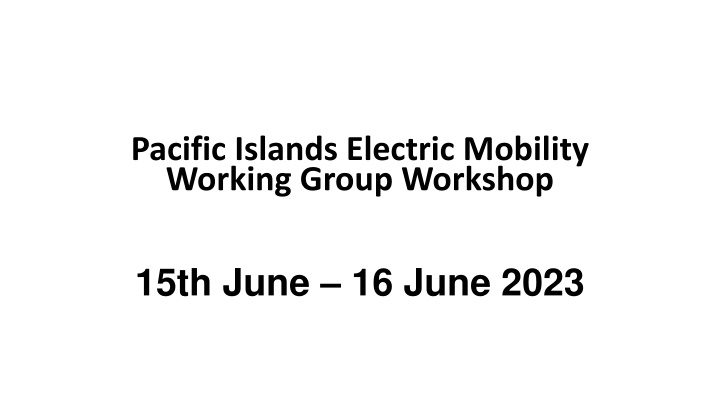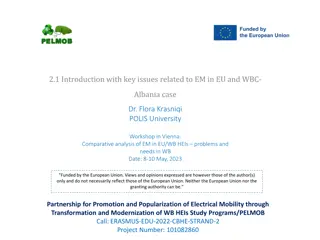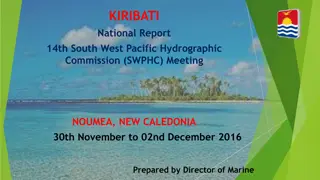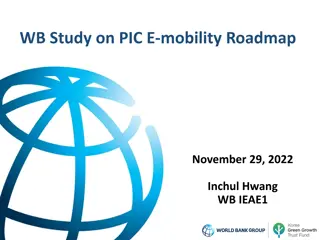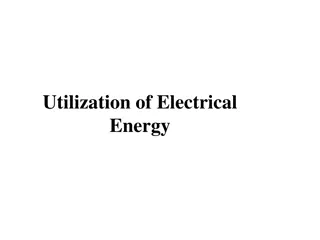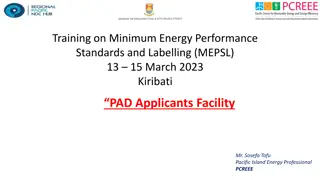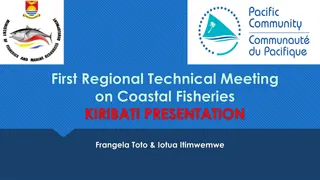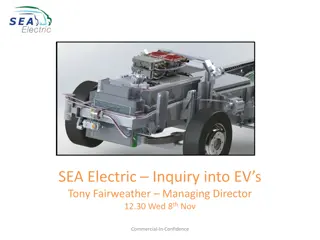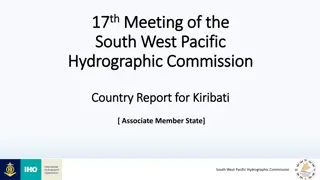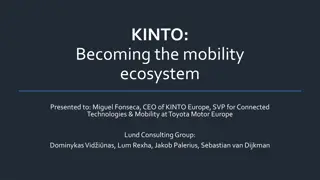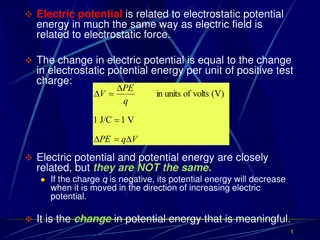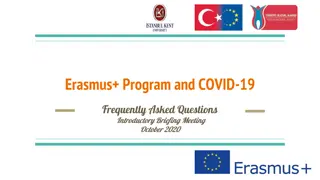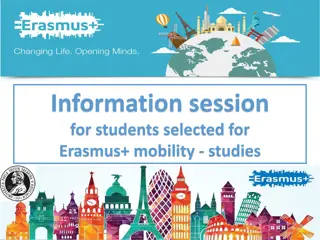Kiribati Electric Mobility Workshop Highlights & Energy Sector Overview
This workshop held in June 2023 discussed the energy sector overview, energy policies, and the Kiribati Energy Act of 2022. Key points included targets for renewable energy adoption, road transportation challenges, and the push for electric vehicle integration. The workshop emphasized the importance of energy efficiency and the role of key organizations in the energy sector.
Download Presentation

Please find below an Image/Link to download the presentation.
The content on the website is provided AS IS for your information and personal use only. It may not be sold, licensed, or shared on other websites without obtaining consent from the author.If you encounter any issues during the download, it is possible that the publisher has removed the file from their server.
You are allowed to download the files provided on this website for personal or commercial use, subject to the condition that they are used lawfully. All files are the property of their respective owners.
The content on the website is provided AS IS for your information and personal use only. It may not be sold, licensed, or shared on other websites without obtaining consent from the author.
E N D
Presentation Transcript
Pacific Islands Electric Mobility Working Group Workshop 15th June 16 June 2023
Content Energy Sector Overview Energy Division role Energy Polices & Framework Energy Act Road Transportation Challenges and Barriers Plans for 2023-2030
Energy Sector Overview KOIL MISE supplying petroleum products throughout Gilbert and Phoenix Islands responsible for the planning, management and coordination of the energy sector PUB EPU provide power, water supply and sewerage services for South Tarawa coordinating the implementation of energy policies and providing necessary advice and assistance on all energy activities and energy- related matters. KGES sale and installations of solar PV systems MLPID responsible for all government services including the development of power, electrification and transmission on Kiritimati Island
Energy Policies & Frameworks Important Energy Targets: 1. SDG 7 by 2030 2. NDC by 2025 3. Fossil fuel use reduction by 2025 South Tarawa 45% (23% RE, 22% EE) Kiritimati 60% (40% RE, 20% EE) Outer Islands > 60% RE for public infrastructures 100% RE for public and private institutions Road Transportation - EV is reflected under the Kiribati Integrated Energy Roadmap 2017. Introduce electric vehicle pilot projects to assess their feasibility for Kiribati and, if viable, support their adoption. Government of Kiribati should spearhead the adoption of more energy efficient vehicles, such as hybrid cars and electric vehicles that use solar PV for charging.
Kiribati Energy Act 2022 Energy Act 2022 Recently endorsed by Parliament in Dec 2022. and has been assented by HE President beginning of this year. Regulation Under Energy ACT Petroleum Minimum Energy Performance Standard Labelling Electricity Part of electricity is regulating the importation, of energy efficient vehicles.
Road Transportation Vehicles Imported into Tarawa between 2004 and 2013 Minivans (10-15 seat) and Pickups Saloon Trucks and Tractors Motorcycles Vehicles Imported 2004- 2013 544 2323 1534 4774 Vehicle Engine Type Internal petrol combustion engine (ESS) Estimated at 65% from total Vehicles imported Diesel internal combustion engine (DSL) Estimated at 33% from total Vehicles imported Hybrid vehicle Estimated at 2% from total Vehicles imported Electric Vehicle 0% No EV imported during this period
Challenges & Barriers Electricity price is high Not enough power generated by Utility Land issue with provision of Renewable Energy Powering Station Lack of understanding to the public on Electrical Vehicles Requires Technical Capacity for maintaining the Electric Vehicles
Propose Plan for 2023 2030 on EV Promoting EV to the public (awareness). Improve the electricity infrastructure (utility) Government initiatives for importation of Electrical Vehicles Exemption for customs charges on any imported EV Provision of free charging station within Government facilities Pilot project on EV can be implemented through Government vehicles (transports) Encourage Private sectors to import EV (cars, bikes, scooters, Motorbikes) Encourage Government companies such as Kiribati Green Energy Solution (KGES) to promote and import EV
